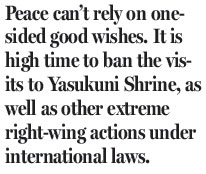Wartime lessons still need heeding
By Wang Yiwei (China Daily) Updated: 2015-02-27 07:44
On the other, abiding by the Charter also calls for relinquishing the Cold War mentality and zero-sum game, and the establishment of a new type of international relationship in which all countries resort to mutual respect and win-win cooperation. This is something that China has been wholeheartedly championing within the international community in recent years.
Confronted with power politics adopted by countries such as the United States, the right-wing provocations of Japan, and religious extremism across the globe, the UN must take the leading role in responding to them.
It should urge all countries to respect each other's core interests and political systems. At the same time, the commemoration of the victory against fascism is not only about remembering wartime history, brutal as it was, but also staying alert to the vicious resurgence of rightism, extremism and terrorism.
Kneeling down at the monument to victims of the Warsaw Ghetto Uprising in 1970, the former West German chancellor Willy Brandt made a landmark step to forge Germany as a peace-loving modern nation that has learned its wartime lesson. In contrast, in 2013 Japanese Prime Minister Shinzo Abe visited the Yasukuni Shrine which honors 14 Class-A World War II criminals.
Peace can't rely on one-sided good wishes. It is high time to ban the visits to Yasukuni Shrine, as well as other extreme right-wing actions under international laws. International unity is needed more than ever to stand up for peace and justice.
The author is a professor of international studies at Renmin University of China.

I’ve lived in China for quite a considerable time including my graduate school years, travelled and worked in a few cities and still choose my destination taking into consideration the density of smog or PM2.5 particulate matter in the region.











